Good Nature, Bad Nature is a research project exploring the current and future management of invasive species, and people's values associated with contentious species.
Our study will help us understand how attitudes to invasive species are formed, and consequently how to generate support for their current and future management.
About our research
The impact of invasive species in New Zealand
New Zealand faces a huge ecological problem from invasive plants and animals (e.g. possums, stoats, deer, wilding pines) spreading across the country impacting native species and landscapes – a problem expected to grow with climate change. Controlling invasive species, at a cost of NZ$1.4 billion per year, depends upon ongoing public awareness and support. However this is in question due to disagreement over what is 'good' or 'bad' nature.
Some invasive species may be important for local communities e.g. for food, firewood, recreation or tourism, leading those communities to reject control programmes. Also, New Zealand is becoming more culturally diverse, but we know little about how Māori, Pasifika or recent migrants value invasive species, nor the views held by young New Zealanders.
Four case studies exploring tolerance for, and control of, invasive species
In this research we investigate the level of tolerance for invasive species and the level of support for their control, within our communities. Our four case-studies each explore people's values associated with a contentious invasive species:
- Wild pigs in Northland
- Wilding conifers in the Southern Lakes district
- Himalayan tahr in the Southern Alps
- Koi carp and rudd in the Waikato region
Contact us
Email invasives@otago.ac.nz
Our people
Professor Brent Lovelock, Principal Investigator
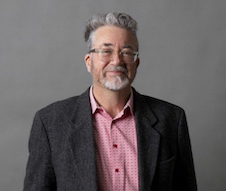 This Marsden-funded project brings me in full circle back to my roots – my love of our native flora and fauna, my concern for its conservation, and my fascination with what is natural, what is 'good' or 'bad' nature in our increasingly globalised and hybrid world.
This Marsden-funded project brings me in full circle back to my roots – my love of our native flora and fauna, my concern for its conservation, and my fascination with what is natural, what is 'good' or 'bad' nature in our increasingly globalised and hybrid world.
I look forward to engaging with individuals and communities across Aotearoa on this project and learning about how you perceive some of the 'good' and 'bad' nature that we have out there.
Email brent.lovelock@otago.ac.nz
Background
Kia ora tatou, I hail from the mighty Manawatu – a flatlander from a dairy farm who grew to love hills and forests. My early obsession with tramping and hunting led me to apply for a forestry cadetship with the then NZ Forest Service ( NZFS ) and I undertook my forestry training at Gwavas Forest (Hawkes Bay) and then at the University of Canterbury. I worked as an Environmental Forester for the NZFS , mainly monitoring native forest health and the impact of introduced browsing animals throughout the national parks and forest parks of Otago and Southland. This led on to employment with the then new Department of Conservation back in the Manawatu as a planning officer and helping implement their Protected Natural Area programme.
I began my PhD in 1997, looking at sustainable tourism in the national parks of Canada, then went on to start lecturing in the Department of Tourism at the University of Otago, where I have been for 20 years. I am now Head of the Department of Tourism, and also Co-Director of the Centre for Recreation Research.
Associate Professor Anna Carr, Associate Investigator
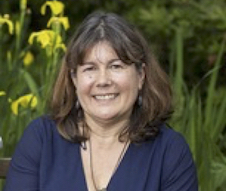 Ko Mamari me Aotea te waka
Ko Mamari me Aotea te waka
Ko Turi te tangata ki runga
Ko Whakatere me Taranaki te maunga
Ko Waima me Waingongoro te awa
Ko Tuhirangi me te marae
Ko Te Mahurehure te hapu
Ko Koroneho me tupuna Māori
Ko Ngāpuhi me Ngāti Ruanui me Ngāti Whātua o Kaipara me Ngāti Ruahine te iwi ki te taha o tōku pāpā
Ko Ngati Pakeha te iwi ki te taha o tōku māmā
Ko Anna Carr tōku ingoa
Ko Otepoti ahau
I have been on academic staff at the University of Otago since 2001. My research interests centre around cultural heritage and the management of tourism and recreation in protected areas. I enjoy teaching, supervising master's and PhD colleagues and serving on the editorial boards of Tourism in Marine Environments, Journal of Ecotourism and the Journal of Heritage Tourism. Working on the Marsden project enables me to incorporate my passion for conserving Aotearoa's Indigenous biodiversity alongside furthering my understanding of how people relate to, recreate in and value the different dimensions of our natural environment.
Email anna.carr@otago.ac.nz
Background
I grew up at Whakapapa Village (Tongariro National Park) and had my values shaped by living in a protected volcanic landscape impacted upon by heather, deer and humans. Before academia, I was owner-operator of two adventure tourism businesses. I had also worked for the NZ Forest Service with pest eradication on Kapiti Island, as a park interpreter with Lands and Survey at Egmont and Tongariro National Parks, had a season at Scott Base (Antarctica) and seven years working for the Department of Conservation at Aoraki Mt Cook National Park. In my 30s I returned to university to undertake my PhD on managing visitors' experiences of cultural landscapes.
Claire Dowsett, PhD researcher
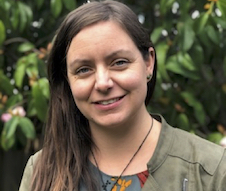
Ko Tuarātapu-o-Te Rangihaeata me Maungatautari ngā māunga
Ko Ruamahunga, Waingawa me Waikato ngā awa
Ko Tainui tōku waka
Ko Ngāti Pākehā te iwi ki te taha o tōku pāpā
Ko Ngāti Raukawa te iwi ki te taha o tōku māmā
Ko Claire Dowsett tōku ingoa
Ko Whanganui ahau
Background
I grew up in 1980s small town New Zealand, Whakaoriori Masterton. I was of the last generation of tamariki to enjoy casual summers swimming in the Wairarapa rivers and catching eels without the need to check if the water was swimmable. The first gardens I tended, the ngahere I walked, the moana I swam, the people, my whānau, have shaped my values.
I completed a Bachelor of Science in Environmental Science and Plant Biology, and then a Post Graduate Diploma in Agricultural Science.
My first science job was with AgResearch Ruakura, Hamilton, in the Weeds Research team. My research focused on the prevention of weeds, invasion pathways and managing weeds through seedbank manipulation.
Choosing to move the family to Whanganui for a better lifestyle, I began working with the Department of Conservation first as a Biodiversity Ranger and then as a Biodiversity Planner. During this time with DOC I experienced diversity in environmental values from impassioned people as kaitiaki in conservation, science, sport and agriculture.
My own experience can influence my perspective, I see the exotics. The whenua tells the story of the journey of many people and is marked by colonisation.
How have the different experiences of New Zealanders shaped values towards introduced species? Are they just weeds and pests, or do they hold more value?
Matthias Spall, PhD researcher
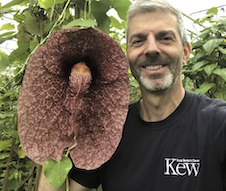 With this project, I am looking to create a better way forward for sustainable tourism, which also sits comfortably with agricultural practices, and ensures the protection of the unique flora of New Zealand. My special focus is on wilding conifers and their effect on the landscape and their social impact on different groups.
With this project, I am looking to create a better way forward for sustainable tourism, which also sits comfortably with agricultural practices, and ensures the protection of the unique flora of New Zealand. My special focus is on wilding conifers and their effect on the landscape and their social impact on different groups.
Background
I was born and raised in Germany and moved to the U.K. in 2012 to study horticulture and garden design. After taking my Royal Horticultural Society exams, I enrolled in a Masters' course at the University of Bath, U.K. The topic of my dissertation is Conservation of Historic Gardens and Cultural Landscapes in New Zealand.
My research brought me to New Zealand where I volunteered at the Botanic Gardens of Auckland, Christchurch and Dunedin. I met many inspiring people and developed my love for New Zealand landscapes and plants.
Anna Clark, Research Assistant
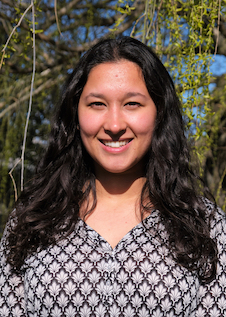 Along my journey of a master's project investigating genetic pest control technology for invasive mammals, like rats, possums, and stoats, I have become aware of the social, political, and economic challenges related to certain conservation initiatives, which has emphasised the importance of community engagement.
Along my journey of a master's project investigating genetic pest control technology for invasive mammals, like rats, possums, and stoats, I have become aware of the social, political, and economic challenges related to certain conservation initiatives, which has emphasised the importance of community engagement.
As a scientist, it is becoming increasingly more important to be aware of the implications of our research and acknowledge the variety of perspectives present in our society. I am incredibly excited to join the team on this Marsden project and I am looking forward to the stimulating conversations moving forward!
Background
Originally from the Hurunui in North Canterbury, I moved to Dunedin about 5 years ago to undertake further education. As an active member of the Hurunui College Nina Valley Restoration Group throughout my teenage years, I was constantly aware of the complex, long-term challenges facing conservation in Aotearoa / New Zealand, particularly surrounding pest control. So as an inquisitive youngster, I pursued a Bachelor of Science majoring in Genetics to gain a molecular understanding of the animals in question, which lead to my master's investigating genetic pest control.
Eru Metcalfe
Ko te Ramaroa te maunga
Ko Awapokonui te awa
Ko Hokianga te moana
Ko Maraeroa te whare tūpuna
Ko Pākanae te marae
Ngāti Korokoro te hapū
Ngāpuhi te Iwi
Ko Ngātokimatawhāorua te waka
Ko Eruera tōku ingoa
Ko Ōtautahi ahau
This project has given me the opportunity to be part of research that deals with an aspect of my personality that has roots in Te Manahuna (The Mckenzie District). Growing up in an area surrounded by mountains, lakes and rivers shaped my attitude I have today toward our native flora and fauna and my world view.
Background
I was born in Timaru, raised for a couple of years in the Hokianga and then moved with my family to Twizel. It was here I developed my values and attitudes toward nature. I was always with friends going out fishing for trout as a young children. Our school had taken us out into the mountains enough times for a love to be built for our forests and mountains.
At University I studied did a Bachelor of Arts in Sociology and Anthropology, and then a Post graduate diploma in Primary school teaching.
This current research that I am a part of is a natural extension for my skill base. It converges on dealing with nature and the implications of the nuanced social dynamics within the field of invasive species. I have always felt compelled toward our nature and using my education training I would like to teach our future kaitiaki a means to navigate the world of protecting our unique flora and fauna.
Dr Stu Hayes, Assistant Research Fellow
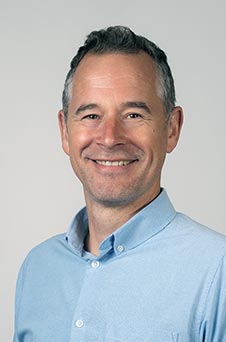 My ongoing research into recreational freshwater angling in Aotearoa New Zealand has served to raise my awareness of the social, political, and economic value of introduced species (e.g., trout) for visitors and locals. I am excited to join the 'Bad Nature, Good Nature' team and look forward to learning more about how different communities perceive, and relate to and with, iconic species including wild pigs, wilding conifers, Himalayan Tahr, and coarse fish!
My ongoing research into recreational freshwater angling in Aotearoa New Zealand has served to raise my awareness of the social, political, and economic value of introduced species (e.g., trout) for visitors and locals. I am excited to join the 'Bad Nature, Good Nature' team and look forward to learning more about how different communities perceive, and relate to and with, iconic species including wild pigs, wilding conifers, Himalayan Tahr, and coarse fish!
Background
I was born and raised in the UK before moving to France in the mid-1990s to work in the tourism industry. I then moved to Aotearoa New Zealand in 2008 and since then have completed a Master of Tourism and a PhD, both with the Department of Tourism, University of Otago. Whether in the UK, Europe, or New Zealand, my love of the outdoors has bought me close to all manner of native and introduced species and each encounter – good or bad – has left its mark. Different species have come to mean different things to me. What do wild pigs, wilding conifers, Himalayan Tahr, and coarse fish mean to you?
